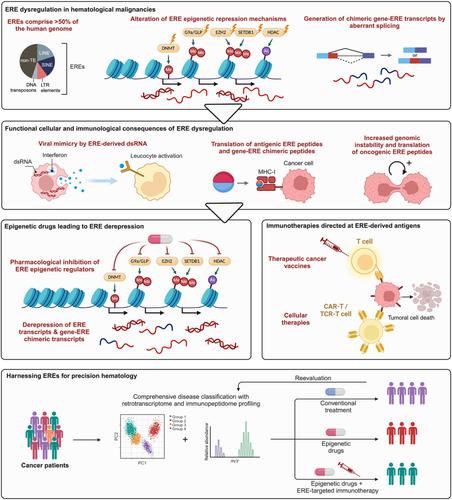当前位置:
X-MOL 学术
›
Am. J. Hematol.
›
论文详情
Our official English website, www.x-mol.net, welcomes your
feedback! (Note: you will need to create a separate account there.)
Endogenous retroelements in hematological malignancies: From epigenetic dysregulation to therapeutic targeting
American Journal of Hematology ( IF 10.1 ) Pub Date : 2024-10-10 , DOI: 10.1002/ajh.27501 Mohamed Chour, Françoise Porteu, Stéphane Depil, Vincent Alcazer
American Journal of Hematology ( IF 10.1 ) Pub Date : 2024-10-10 , DOI: 10.1002/ajh.27501 Mohamed Chour, Françoise Porteu, Stéphane Depil, Vincent Alcazer

|
Endogenous retroelements (EREs), which comprise half of the human genome, play a pivotal role in genome dynamics. Some EREs retained the ability to encode proteins, although most degenerated or served as a source for novel genes and regulatory elements during evolution. Despite ERE repression mechanisms developed to maintain genome stability, widespread pervasive ERE activation is observed in cancer including hematological malignancies. Challenging the perception of noncoding DNA as “junk,” EREs are underestimated contributors to cancer driver mechanisms as well as antitumoral immunity by providing innate immune ligands and tumor antigens. This review highlights recent progress in understanding ERE co‐option events in cancer and focuses on the controversial debate surrounding their causal role in shaping malignant phenotype. We provide insights into the rapidly evolving landscape of ERE research in hematological malignancies and their clinical implications in these cancers.
中文翻译:

血液系统恶性肿瘤中的内源性逆转录元件:从表观遗传失调到治疗靶向
内源性逆转录元件 (EREs) 占人类基因组的一半,在基因组动力学中起着关键作用。一些 ERE 保留了编码蛋白质的能力,尽管大多数 ERE 在进化过程中退化或成为新基因和调节元件的来源。尽管开发了 ERE 抑制机制来维持基因组稳定性,但在癌症(包括血液系统恶性肿瘤)中观察到广泛普遍的 ERE 激活。EREs 挑战了将非编码 DNA 视为“垃圾”的看法,通过提供先天免疫配体和肿瘤抗原,被低估了癌症驱动机制和抗肿瘤免疫的作用。本综述重点介绍了理解癌症中 ERE 共选择事件的最新进展,并重点关注围绕它们在塑造恶性表型中的因果作用的有争议的争论。我们深入了解血液系统恶性肿瘤 ERE 研究的快速发展前景及其在这些癌症中的临床意义。
更新日期:2024-10-10
中文翻译:

血液系统恶性肿瘤中的内源性逆转录元件:从表观遗传失调到治疗靶向
内源性逆转录元件 (EREs) 占人类基因组的一半,在基因组动力学中起着关键作用。一些 ERE 保留了编码蛋白质的能力,尽管大多数 ERE 在进化过程中退化或成为新基因和调节元件的来源。尽管开发了 ERE 抑制机制来维持基因组稳定性,但在癌症(包括血液系统恶性肿瘤)中观察到广泛普遍的 ERE 激活。EREs 挑战了将非编码 DNA 视为“垃圾”的看法,通过提供先天免疫配体和肿瘤抗原,被低估了癌症驱动机制和抗肿瘤免疫的作用。本综述重点介绍了理解癌症中 ERE 共选择事件的最新进展,并重点关注围绕它们在塑造恶性表型中的因果作用的有争议的争论。我们深入了解血液系统恶性肿瘤 ERE 研究的快速发展前景及其在这些癌症中的临床意义。


















































 京公网安备 11010802027423号
京公网安备 11010802027423号